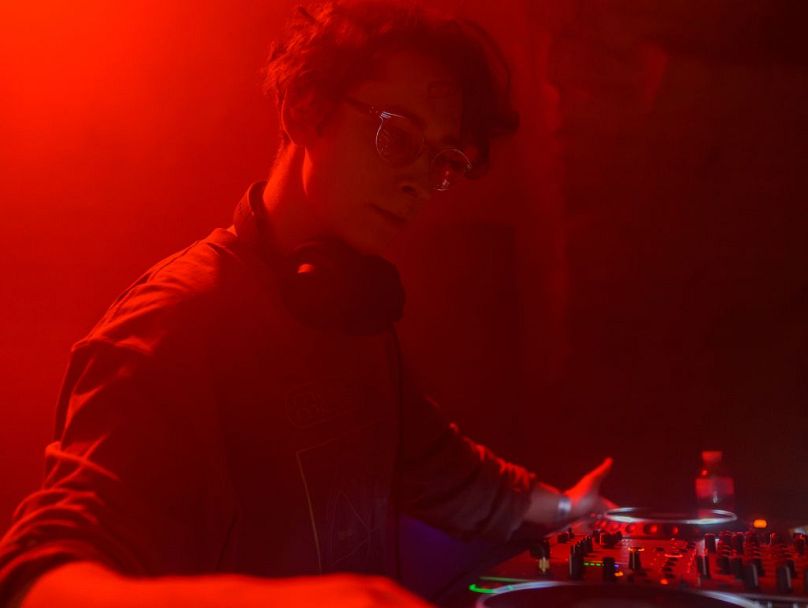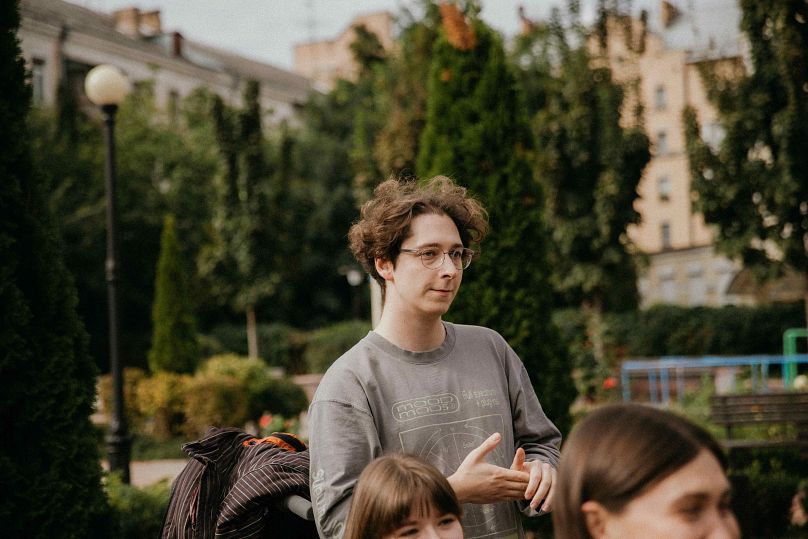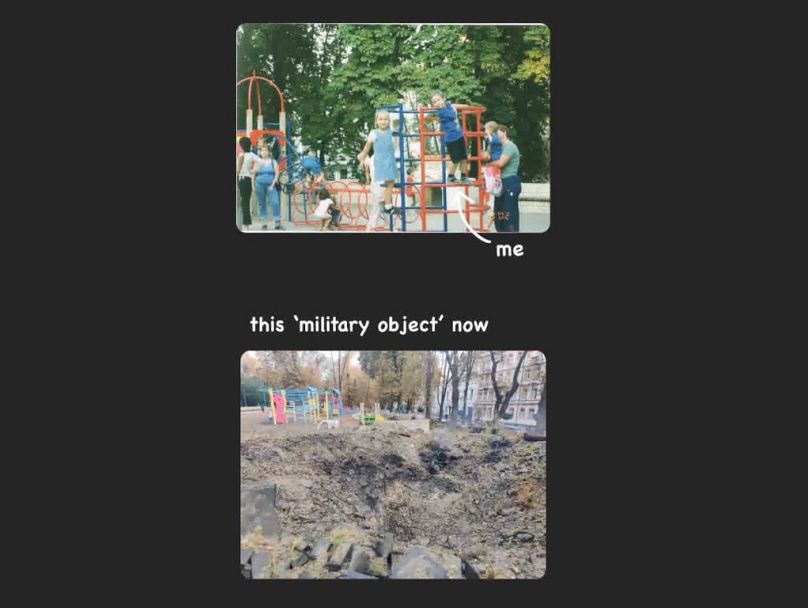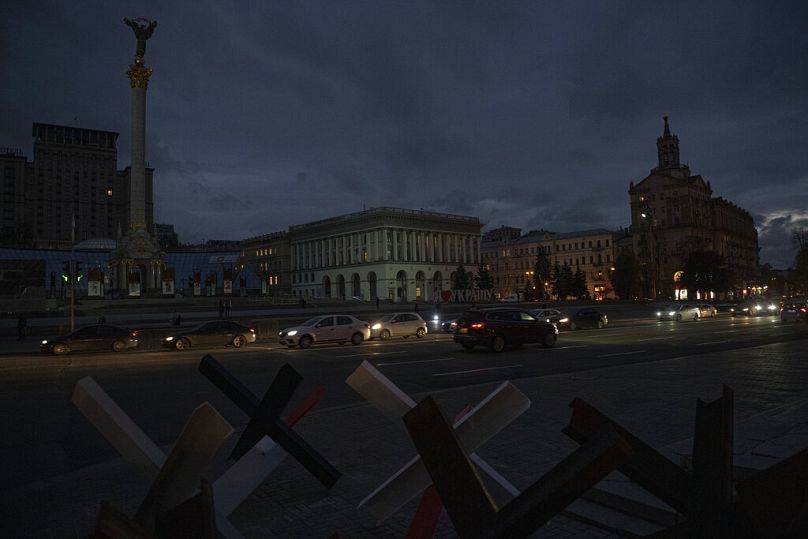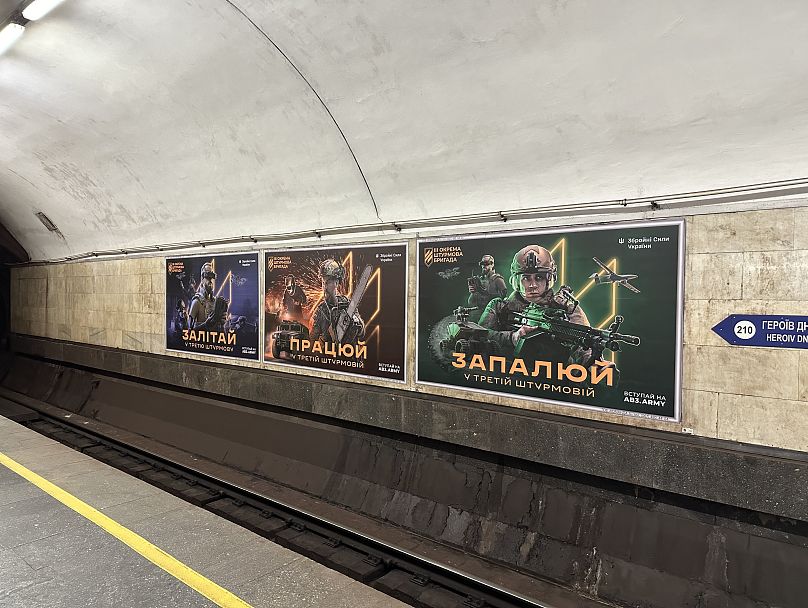Euronews spoke to Kyiv-based producer Dima, also known as BADWOR7H, about living in Ukraine during Russia's full-scale invasion of Ukraine, the concept of ‘relative safety’ and the form of escapism music offers.
At the age of 10, Dima’s musical path took a turn: "I randomly stumbled upon an installer file for FL Studio, a digital audio workstation used for audio production. I started tweaking knobs mindlessly," the Kyiv-based musician remembers. Back then, YouTube was in its early stages, and tutorials on sound production were scarce.
"At that age, I loved sitting in front of the computer; it was a form of escapism for me", he explains, adding that it helped ease his anxiety – a sentiment that still resonates with him now. Over time, his passion led him to an unconventional choice: pursuing a career in the underground genre of Hard Bass.
Things started to change during the pandemic. Dima, also known as BADWOR7H, went through a year-long artistic crisis, and his disillusionment with the genre grew. "I got bored with the music and the challenges of the underground scene", he says.
Seeking a new direction, Dima eventually teamed up with a friend, Chocollab, and together, they produced an EP titled KYIVENERGO. "We started working on the EP before the full-scale invasion. The lyrics were initially written in Russian, as we were still speaking it at the time," he says.
After Russia started its full-scale invasion, they overhauled the EP and changed the lyrics to Ukrainian. Russian was Dima's mother tongue, but since the full-scale invasion, he doesn't want to speak the 'aggressor's' language anymore and switched to Ukrainian.
"I woke up from the fifth explosion"
When thinking back to the 24th of February 2022, Dima remembers having woken up to loud explosions. "My mum started messaging me in a panic. Her anxiety affects me. I inherited that trait from her", he explains adding, that even though his mother wanted to leave Kyiv straight away, they ended up staying for two more days. "The main issue for me was not just the immediate risk but also the lack of reliable information", he says.
"Until then, I had been getting news from unreliable public channels flooded with Russian bots and misleading information. But my mum read something about Russian forces coming to Kyiv, which made her more anxious. So, we decided to leave. The ride out was a nightmare," he explains. They went to their house in Rzhyshchiv, a town around 80 kilometres from the capital. Dima said, it didn’t feel any safer and his mother ended up fleeing the country after three weeks.
Dima stayed, not being able to leave the country anyway due to martial law – men aged 18 to 60 are currently barred from leaving the country – and not having the financial resources to relocate to the western part of the country, which is generally considered safer. After several weeks, his friend Chocollab contacted him, and they finally finished the EP. They decided it wasn’t the right time to release it, though.
When parties began to re-emerge in Kyiv, they tested the new material. The positive reception led them to release KYIVENERGO. "By August 2022, some friends of ours were hosting a festival of street culture and electronic music called Брудний пес, and we decided to present the album there," he adds.
Following their release, the duo played at charity gigs organised by initiatives, such as Repair Together, which focuses on rebuilding communities affected by Russia’s war on Ukraine. During these so-called 'rave clean-up-parties', DJs were playing for volunteers, who were cleaning up and rebuilding houses destroyed during the Russian occupation or attacks.
The concept of ‘relative safety’
"The war has certainly influenced my emotions and music. Even negative emotions motivate me to create", Dima explains, saying that in a sense, he feels the saying humans adapt to everything is kind of true in his case. "But what do we include in the term 'adapted'", he asks, thinking about what living life 'normally' even means.
"If you include going to work, sitting in a café, things like that, then I started 'adapting' when Chocollab and I decided to go back to Kyiv in June 2022", he explains. "I call it the concept of 'relative safety'. I thought if I'm somewhere in the middle of nowhere I'm less likely to be a target for missiles. But then I realised that that makes me feel bad. I've come to realise I would rather live fully for a shorter period than the opposite; living in fear and for a long time", he explains.
He adds that after the Ukrainian Armed Forces liberated occupied villages in the Kyiv region, there were few explosions in the city centre. "In October 2022, there were fragments of a missile that fell onto a playground in Shevchenko Park in Kyiv. It was a few metres from the university I graduated from," he says and shows a photo of him as a child on the playground, which was hit by the fragments of a Russian missile. "It felt like a reality check", he says.
"I'm into harder music genres. So I'm used to screeching and distorted sounds and heavy basses. I can sleep to Frenchcore [a subgenre of hardcore]", he explains, calling his taste in music the reason he thinks he might not be as triggered by the sound of explosions. "It’s neither an advantage nor a disadvantage", he says, "It’s a disadvantage if you want me to be effective in a critical situation, but it has helped me to avoid sleepless nights – to some extent."
Air raid sirens blaring over Kyiv
When it comes to electronic music, the 27-year-old has found the war creeping into places he didn’t expect it to. "You realise how common the sound of sirens is in electronic music", he says. Ukrainian DJs are therefore extra-cautious when selecting music for their sets, as the sound of sirens can be triggering for some.
The wail of sirens is something many Ukrainians have become accustomed to. Depending on your location, the air raid siren could go off several times a day. With Russia having increased its attacks on Ukraine’s cities, such as Kyiv and Kharkiv, the air raid siren has become a harrowing constant in people’s lives.
The Ukrainian singer Melancholydi has posted a video on TikTok, which shows this constant in the lives of many Ukrainians. She harmonised with the blaring air raid siren, turning something harrowing into something beautiful.
"Recently, I was working on a track", Dima recollects, "and the air raid siren was blaring. I found it ‘fascinating’ how the sound was the same key as the melody I was working on. It felt like a giggle of despair because, at this point, there had to be a strange shift in our brains [when it comes to the sounds of war]."
Charging your phone or working on new music?
Since the start of the full-scale invasion, Russia has increasingly attacked Ukraine’s energy infrastructure. Due to power plants having been attacked by Russian missiles, Ukraine had to re-introduce rolling energy blackouts to save electricity. As a producer, Dima is dependent on electricity.
"I bought a big power bank with two Kilowatts. It couldn’t supply all my gear, though", he says, adding that he doesn’t feel comfortable working on them anyway – in case the blackout schedule is off. "When you don’t know if you’ll have electricity in the next 24 hours, you preserve the electricity you have to charge your phone or have some light in the evening."
For him, that means he essentially cannot be productive during those days.
Creating music helps Dima with his anxiety and deal with everything going on in his life – alongside the full-scale invasion. "I had a mental breakdown at the beginning of June. It was hard to distinguish whether I wasn’t making music because of my mental state, or if not making music was making my state worse," he admits. In Ukraine, everyone is taking life on a day-by-day basis, and no one knows what the next day has in store.
"I love Kyiv," Dima said, reflecting on the deep connection that has kept him rooted in the city despite the challenges. "Another reason why I don't want to leave is because my grandmother is here, and I have people who depend on me," he continued, pausing to acknowledge the practical difficulties of relocating. Besides producing music, the 27-year-old also offers music production courses.
Dima isn't the only one who sees his future in Ukraine. A recent poll by the Ilko Kucheriv Foundation 'Democratic Initiatives' with the sociological service of the Razumkov Center has found that around 86% of Ukrainians want to build their future in Ukraine. Moreover, 59% have a clear intention to stay in the country.
Dima talks about the sense of belonging he feels among those who share his cultural background and values. "When I network, when I communicate, or when someone stops me on the street, it reinforces why I’m here. I’ve invested my life here. There were years when I wasn’t known, and I felt isolated – trapped, even. I knew I needed to network to advance my career, but I didn't know how." Dima's artistic aim is ambitious: "I want Ukrainian electronic music to be recognised for its top-notch production quality across all genres", he says.
"If no one confronts them on the front line, Kyiv could be the next Bucha"
In April, Ukraine's top prosecutor Andriy Kostin said Russian atrocities in the temporary occupied Ukrainian territories, as well as the Bucha massacre, exhibit a consistent pattern of genocidal behaviour that warrants prosecution both within Ukraine and ultimately by the International Criminal Court. According to the Ukrainian authorities, Russian forces have killed at least 1,400 people, including 37 children, in Bucha.
In the first month of the full-scale invasion, several thousand men joined the Ukrainian Armed Forces voluntarily. Since then, the numbers have decreased. In December 2023, Ukrainian President Volodymyr Zelenskyy has announced that the Ukrainian Armed Forces needed to mobilise up to 500,000 soldiers. This number has since been revised by Army chief Oleksandr Syrskyi. An updated number has not been released since.
In response, the Ukrainian government approved a bill this spring, which lowered the conscription age from 27 to 25. Since the law has been adopted, men are obliged to update their details online and show them to either conscription- or police officers when asked.
"I'm scared of joining the army", Dima says. "I see that as a path leading to a pessimistic outcome: one where I’m killed. I feel ashamed to admit this. When I see soldiers, I can only admire them for their selfless bravery and courage", he says.
He continues: "But I’ve seen what Russia brings to Ukraine. We’ve all seen Bucha. And it hit me – if no one confronts them on the front line, Kyiv could be the next Bucha. When faced with a choice between being slaughtered like the innocent people in Bucha or going to the front line, the answer is clear: you go to the front. What more needs to be said?"












